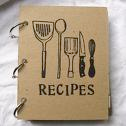Adapting Recipes on a Renal Diet
By the Renal Dietitians, Edinburgh Royal Infirmary

As patients have varying degrees of renal failure and on different forms of treatments, it is very difficult to provide recipes which are suitable for every patient.
The following tips should be useful when deciding what food or meals to prepare. In most cases, “special recipes” are not required as it very much depends on other foods or drinks chosen throughout the day.
Many standard cookbook or celebrity chef recipes can be used safely or adapted slightly with some imagination. The internet is a good resource for lots of recipes. See the information below for some suggestions.
No Added Salt diet
- A small amount of normal salt can used in cooking but the less the better!
- Taste food before adding further salt, add a bit less than the recipe suggests!
- Avoid using salt substitutes eg lo salt or reduced sodium varieties.
- Try using more fresh or dried herbs, spices, pepper, garlic or chilli.
- If using butter or margarine, choose the unsalted varieties.
- Limit using smoked or salty foods eg smoked bacon, olives, salami
- Use cheese sparingly as this can be salty
- It is a good idea to make your own sausages, burgers, kievs etc as homemade ones will have significantly less salt in them than pre prepared ones, especially the lower quality, cheaper ones.
Low Potassium Diet
- Try using rice, pasta, noodles, couscous or breads instead of potatoes at meal times. This would lower the overall potassium content of the the dish and therefore allow the use of tomatoes and vegetables. These could be used either in sauces or as ingredients eg tomato pasta, a stir fry with rice/noodles or curries with rice
- Potatoes and many vegetables can be soaked or par boiled before being added to recipes eg carrots, broccoli or cauliflower in a curry
- Bean and pulses dishes are a good substitute for meat dishes but try and avoid using alongside meat or chicken in the same meal.
- For dishes that contain high potassium vegetables eg mushrooms these could be substituted for lower potassium vegetables eg courgettes, green beans. You could also have a small amount with a rice or pasta accompaniment eg mushroom risotto
- Avoid steaming vegetables, boiling is better.
- Drained tinned fruit is a good choice in puddings.
Low Phosphate Diet
- If dishes contain cheese, try using this sparingly or choosing a lower phosphate cheese eg brie, camembert, parmesan, feta, cottage cheese.
- Double cream, crème fraiche or double cream plus water is a good alternative to single cream, milk, custard or yoghurt.
- Limit dishes containing liver, kidney or other offal.
- White fish is a good choice at mealtimes
- Egg whites are lower in phosphate than egg yolks eg meringues
Fluid Restriction
- Ensure you follow the “no added salt” advice above.
- Avoid very runny sauces or too much gravy.
- Rice and Pasta are OK to have, even though they absorb water and they are a good choice if on a potassium restriction.
- Beware of some puddings eg jelly, custards etc as these will contribute to fluid intake.

